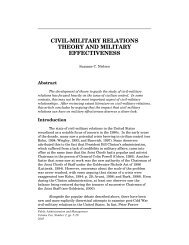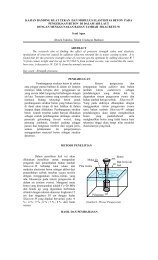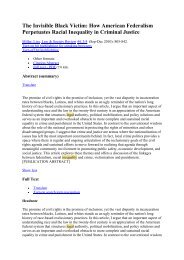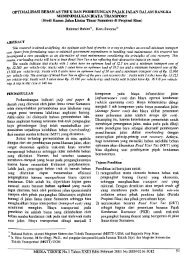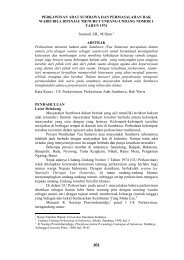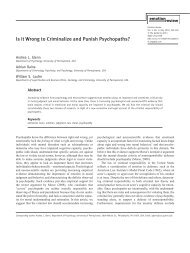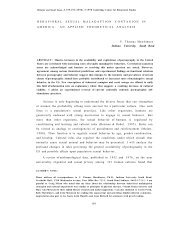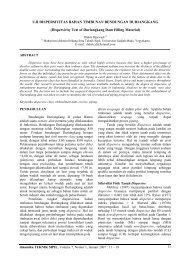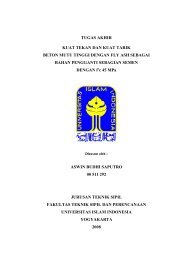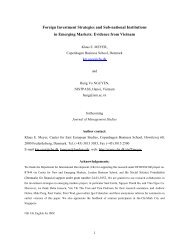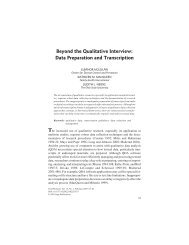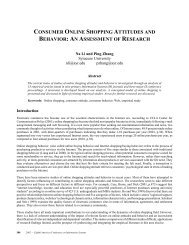Ski – resort and regional development: profile of visitors ... - E-Journal
Ski – resort and regional development: profile of visitors ... - E-Journal
Ski – resort and regional development: profile of visitors ... - E-Journal
Create successful ePaper yourself
Turn your PDF publications into a flip-book with our unique Google optimized e-Paper software.
44<br />
Filio Lazana, Diana Draganescu, Georgiana Grama, Magdalina Yarichkova<br />
with the World Tourism Organization (WTO), tourism is the main source <strong>of</strong> income for almost<br />
40% <strong>of</strong> the world’s countries (Quinn, 2003).<br />
Tourism is associated with enjoyment, <strong>and</strong> according to various typological models, most<br />
tourists rank security <strong>and</strong> comfort as essentials for a vacation site.<br />
Nevertheless, the emerging global economy <strong>and</strong> communication networks, <strong>of</strong> which the<br />
internationalization <strong>of</strong> tourism is an integral part, make tourism increasingly subject to the<br />
effects <strong>of</strong> political instability <strong>and</strong> violence.<br />
In this global environment, safety <strong>and</strong> security considerations constitute one <strong>of</strong> the major<br />
issues that affect travelers when selecting a travel destination. Perceptions <strong>of</strong> political stability<br />
<strong>and</strong> safety are a prerequisite for tourist visitations (Brackenbury, 1995). Natural disasters,<br />
terrorist attacks <strong>and</strong> political instability that are prevalent in certain parts <strong>of</strong> the world raise<br />
the tourists’ awareness <strong>of</strong> the importance <strong>of</strong> safety <strong>and</strong> security factors when choosing a<br />
destination <strong>and</strong> can all alter tourists’ travel behaviour. The effects <strong>of</strong> these acts aimed against<br />
tourists have proved devastating to tourism destinations, damaging not only the tourist<br />
infrastructure <strong>and</strong> arrivals, but the longer-term image <strong>of</strong> the destination as well. Tourism<br />
stakeholders seem to embrace these concerns <strong>and</strong> strive to take related measures to satisfy<br />
travelers’ needs.<br />
This study explores how safety <strong>and</strong> security factors affect leisure tourism <strong>and</strong> the choice <strong>of</strong><br />
a destination. Are tourists willing to visit a destination that has been recently hit by a natural<br />
disaster, such as the tsunami in Indonesia, or by a terrorist attack, such as the bombing in<br />
London? How quickly will a tourist forget the safety or security incident when making their<br />
choice <strong>of</strong> destination? What are the elements that need to be introduced <strong>and</strong> emphasized in<br />
order to make a tourist perceive a destination as safe <strong>and</strong> secure?<br />
A differentiation was made between the terms “safety” <strong>and</strong> “security”. According to different<br />
sources (Glaesser, 2003; Monahan, 2006; wikipedia) 1 , safety refers to the effects <strong>of</strong> accidents<br />
or hazardous forces <strong>of</strong> nature (things that cannot be anticipated or prevented), such as hurricanes,<br />
maladies, <strong>and</strong> earthquakes, while security involves anthropogenic factors, such as political<br />
instability, economic insecurity, terrorist attacks etc. Disasters are episodic events that disrupt<br />
the tourism industry on a regular basis (Sonmez et al., 1999; Faulkner, 2000), termed as a<br />
disaster being any sudden, r<strong>and</strong>om or great misfortune. Disasters can take many forms <strong>and</strong><br />
can include natural events, such as floods, typhoons <strong>and</strong> earthquakes, or human induced<br />
events, such as war <strong>and</strong> terrorism. Terrorism is defined as any act <strong>of</strong> violence that countries<br />
may exchange; its beginnings may be traced back to as early as the mid-1930s (ibid).<br />
Security is a concept that, at present, is associated not only with tourism, but with a larger<br />
scope as well. As a result <strong>of</strong> the events <strong>of</strong> September 11 th 2001 <strong>and</strong> the American-led invasion<br />
Tourism Today - Fall 2007 - Full Paper



